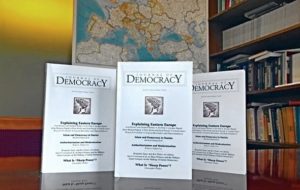 For the past twenty-five years, Andrzej Nowak, a decorated historian of Poland and Russia, has been conducting regular interviews with Jarosław Kaczyński, the leader of Law and Justice, the conservative political party that came to power in Poland in 2015, notes Elisabeth Zerofsky.
For the past twenty-five years, Andrzej Nowak, a decorated historian of Poland and Russia, has been conducting regular interviews with Jarosław Kaczyński, the leader of Law and Justice, the conservative political party that came to power in Poland in 2015, notes Elisabeth Zerofsky.
Since then, liberal leaders and intellectuals in Western Europe have begun to fear that the country, after two decades as the model student of European liberalism, is retreating from democracy, she writes for The New Yorker:
 Critics point to the loyalists at the heads of public media, the increasing harassment of opposition politicians and judges, the country’s refusal to accept its European Union-mandated quota of refugees, and, especially, a series of dramatic reforms to the court system that may consolidate Law and Justice’s control. The Party says that these are necessary modernizations of Poland’s creaky institutions, which were mostly established after the country negotiated an end to Communist rule, in 1989. “You may disagree,” Nowak told me. “But Kaczyński perceived that the lack of revolutionary change after 1989 was something for which Poland paid very dearly.”
Critics point to the loyalists at the heads of public media, the increasing harassment of opposition politicians and judges, the country’s refusal to accept its European Union-mandated quota of refugees, and, especially, a series of dramatic reforms to the court system that may consolidate Law and Justice’s control. The Party says that these are necessary modernizations of Poland’s creaky institutions, which were mostly established after the country negotiated an end to Communist rule, in 1989. “You may disagree,” Nowak told me. “But Kaczyński perceived that the lack of revolutionary change after 1989 was something for which Poland paid very dearly.”
 The July 2018 edition of the National Endowment for Democracy’s Journal of Democracy features an eight-article cluster on rising illiberalism in Central and Eastern Europe, an essay on authoritarian sharp power, and more. The NED’s International Forum asks five leading experts: What is the Root Cause of Rising Illiberalism in Central and Eastern Europe?
The July 2018 edition of the National Endowment for Democracy’s Journal of Democracy features an eight-article cluster on rising illiberalism in Central and Eastern Europe, an essay on authoritarian sharp power, and more. The NED’s International Forum asks five leading experts: What is the Root Cause of Rising Illiberalism in Central and Eastern Europe?
There appears to be a populist convergence between west and East Europe, Zerofsky adds:
In March, after the Italian elections, which were won by outsider parties, Éric Zemmour, one of the most widely read columnists in France, wrote that the media had lectured the public about a divide in Europe between “East and West, between societies that don’t have a long democratic tradition, and ours—old, admirable democracies, multicultural societies distanced from their Christian roots and marked by an impeccable rule of law.” Voters in Britain, Austria, Germany, and now Italy were proving this theory wrong. “Elections in Western Europe show that the people are in agreement with the leaders of the East,” Zemmour wrote. RTWT







